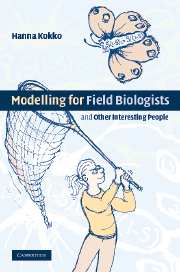Book contents
- Frontmatter
- Contents
- Preface
- 1 Modelling philosophy
- 2 Population genetics
- 3 Quantitative genetics
- 4 Optimization methods
- 5 Dynamic optimization
- 6 Game theory
- 7 Self-consistent games and evolutionary invasion analysis
- 8 Individual-based simulations
- 9 Concluding remarks
- Appendix: A quick guide to MATLAB
- References
- Index
7 - Self-consistent games and evolutionary invasion analysis
Published online by Cambridge University Press: 05 June 2012
- Frontmatter
- Contents
- Preface
- 1 Modelling philosophy
- 2 Population genetics
- 3 Quantitative genetics
- 4 Optimization methods
- 5 Dynamic optimization
- 6 Game theory
- 7 Self-consistent games and evolutionary invasion analysis
- 8 Individual-based simulations
- 9 Concluding remarks
- Appendix: A quick guide to MATLAB
- References
- Index
Summary
where winter is approaching once again,
and we wonder if the promise of the coming spring
should convince us to stay put.
What does the title of the current chapter mean? The idea of self-consistency is simple: the model should not contain contradictions of logic. This sounds fairly obvious, but consider the following pitfall. In a model of parental care, a male is given a specific pay-off (fitness gain) if he deserts his brood after reproduction has taken place and starts searching for other females. If this pay-off is greater than the fitness gain from caring for his current brood, the strategy of deserting will spread. This is the essence of a very influential game of sex roles and parenting decisions (Maynard Smith 1977), yet current analysis (Houston and McNamara 2005) reveals that it is not self-consistent. Maynard Smith made the assumption that pay-offs from deserting depend on how the male's own mate responds to the situation, but another kind of frequency dependence was not included: the pay-off stayed constant, regardless of how common the strategy of deserting males was in the population. Why is this dodgy? Because if there is an increasing number of males searching for a limited number of females, the competitive situation must change as a result, and the pay-off should respond accordingly. Also, the number of females available must change with their breeding strategies.
- Type
- Chapter
- Information
- Modelling for Field Biologists and Other Interesting People , pp. 140 - 162Publisher: Cambridge University PressPrint publication year: 2007



